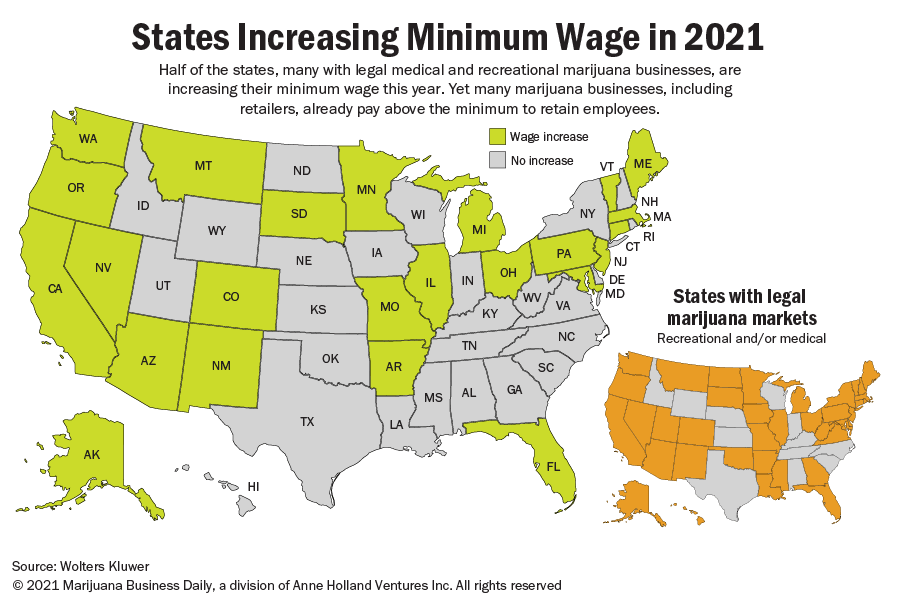Marijuana businesses that remained open during the COVID-19 pandemic now face a brand-new challenge: tight labor markets and intense competition for entry-level employees as the economy springs back to life.
The labor crunch has marijuana cultivators, manufacturers and retailers all scrambling to attract hourly workers against other industries offering wage hikes, increased benefits and even free iPhones to attract new workers.
The challenge comes even as roughly two dozen states are starting to halt the $300 enhanced weekly unemployment benefit that were established at the beginning of the pandemic.
Advocates of ending the benefit argue the move will spur unemployed workers to find jobs.
For marijuana businesses that were allowed to stay open during the pandemic – many getting expanded business opportunities in states that allowed cannabis delivery or extended hours – managers now find themselves facing increased competition for hiring employees.
“A lot of businesses are starting to hire again, to go backfill all those positions they would have loved to see filled in 2020,” said Coree Schmitz, chief of staff at Vangst, a cannabis-focused recruiting firm based in Denver.
Speaking recently about the marijuana labor market at a Prohibition Partners conference, Schmitz pointed out that cannabis demand increased during the pandemic.
Sales of medical and recreational marijuana products in 2020 smashed former records set in mature markets such as Colorado and Oregon. In emerging markets, including Illinois and Ohio, sales set new, high bars for performance.
“The market demand never slowed down,” she said.
Vangst says the number of marijuana industry jobs has grown from 120,000 in 2017 to 321,000 today.
Pressure at the bottom
Hourly and entry-level workers are the hardest to find right now, cannabis operators say.
“There is and always will be a competitive environment for employees who are willing to work hard,” said Matthew Emory, vice president for operations at Captor Retail Group, which operates nine California dispensaries and employs about 150.
Based in Santa Monica, California, Captor offers introductory wages in the high teens for many. Emory said the cannabis industry is somewhat buffeted from labor trends because the sector is dynamic and interesting.
“It’s not working on a line in a kitchen or digging a ditch,” he said. “It’s a healthy, fun environment where you get to be around like-minded people.”
Still, the cannabis industry is facing the same headwinds as other industries that rely on hourly front-line staff.
Between late 2019 and March of this year, workers without college degrees reported a 19% growth in their “reservation wage,” a term economists use to describe the minimum compensation workers require. That’s according to a survey from the Federal Reserve Bank of New York.
The same survey found that more than 1 in 5 people reported searching for a new job in March, a signal that employees are looking for better opportunities.
Competing on opportunity
Marijuana operators say the key to attracting and retaining hourly employees is to give workers a clear path to advancement.
At California-based Vertical Cos., which operates marijuana and hemp growing operations in California and Kentucky, employees are offered ownership stakes and increased wages.
The enhancements help keep workers engaged, especially in the cultivation and manufacturing sectors, Vertical Vice Chair Smoke Wallin said.
“People are getting such large payments on unemployment that you have to get people back to work,” he told MJBizDaily.
The bigger lure, he said, is joining a growing industry.
“It’s an exciting category, and people see a big future in it,” Wallin said.
The challenge is ensuring that entry-level staff cannabis sees a path to those future opportunities, said Christina De La Rosa, CEO and co-founder of The People’s Dispensary in California and Oregon.
“I think the biggest issue in the job market today is, how to do the workforce development to be able to fill those positions,” she said at the Prohibition Partners conference.
She predicts a “chokehold” for non-retail staff in cannabis in 2022 — meaning cannabis companies should act now to develop in-house talent for those positions.
“There is a shortage of people who can do the cultivation … the manufacturing and the distribution,” she said.
Kristen Nichols can be reached at kristen.nichols@hempindustrydaily.com.






